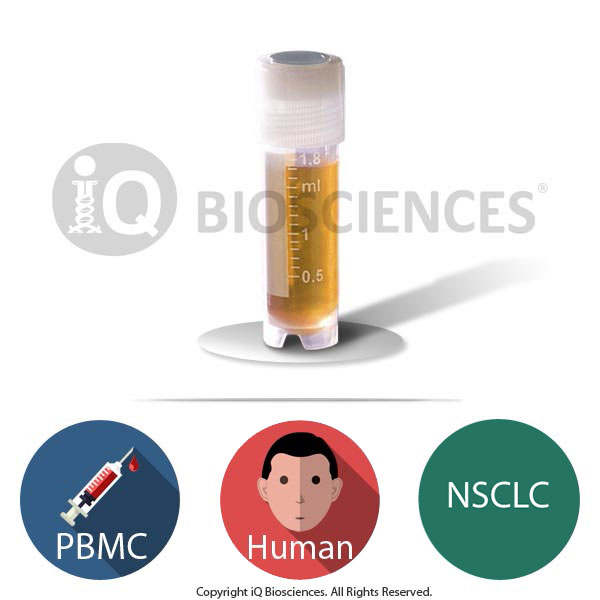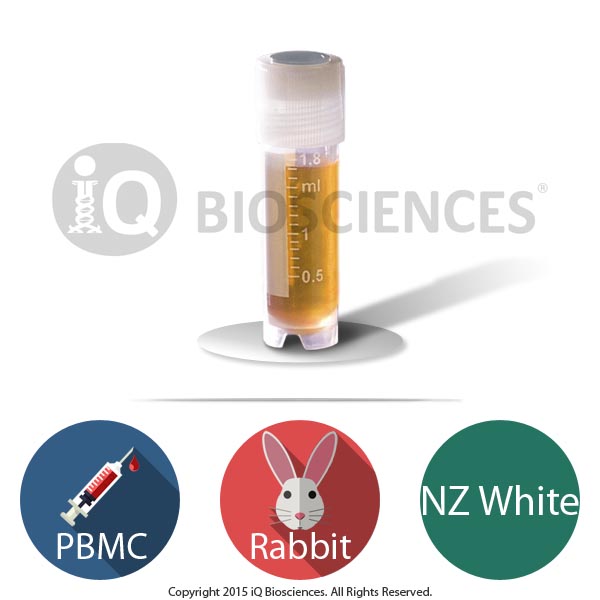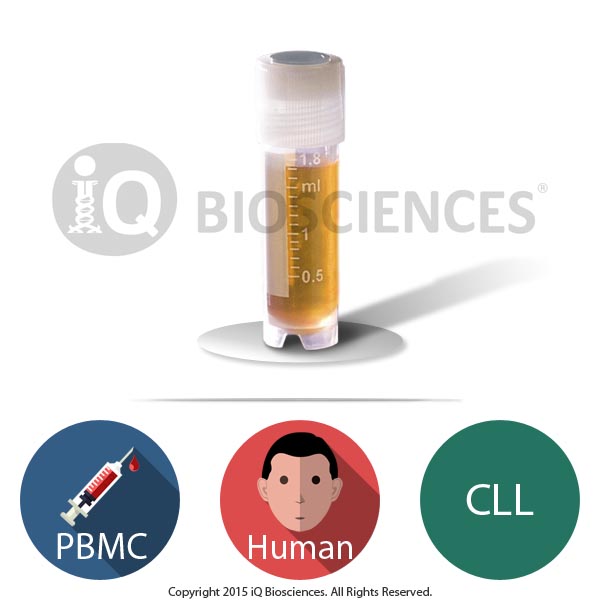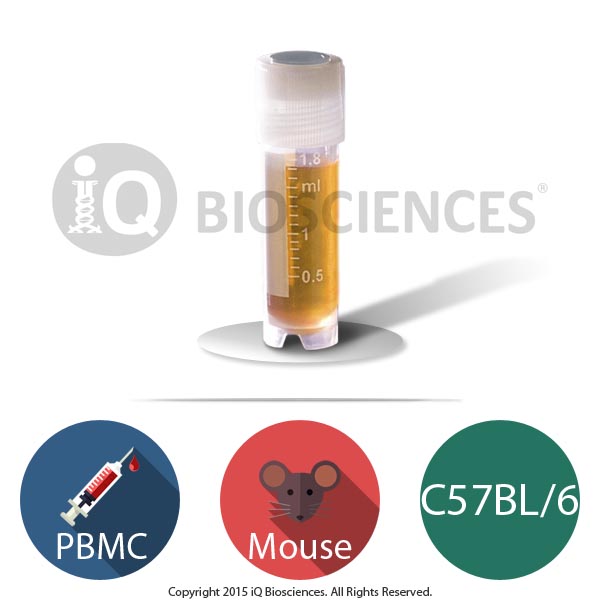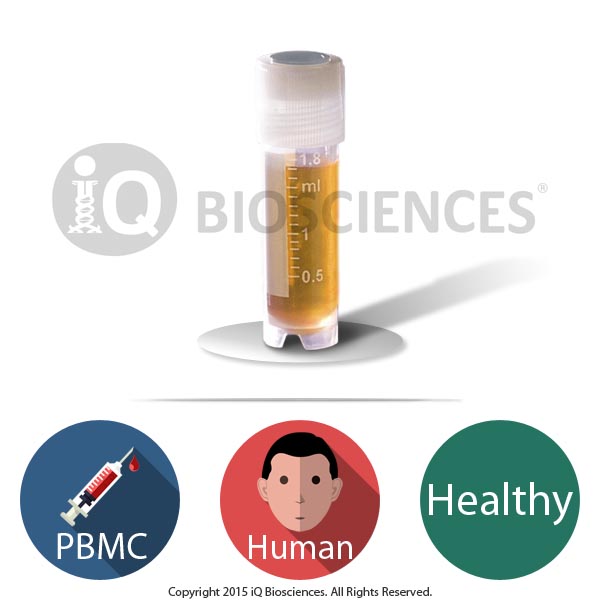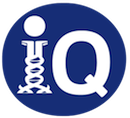- High-quality PBMCs from patients with non-small cell lung carcinoma (NSCLC) sourced from a world-renowned blood center
- High viability (> 90%) after thawing
- Used for a wide variety of immunology-based applications, including in vitro immunoassays, population characterization, sequencing studies, and biologic testing
- All orders come with an iQ Certificate of Analysis
- Normally ships out same business day
Human Non-Small Cell Lung Carcinoma (NSCLC) Peripheral Blood Mononuclear Cells (PBMCs)
$690.00 – $1,000.00
- Description
- Additional information
- Donor Request
- Ethics
- iQ Experience
- Shipping Information
- Distributors
Description
About Non-small Cell Lung Carcinoma (NSCLC) and Our Donors
Non-small cell lung carcinoma (NSCLC) makes up approximately 85% of all lung cancers and is characterized by transformed lung epithelium. The most common types of NSCLC are adenocarcinoma, large cell carcinoma, and squamous cell carcinoma. Lung adenocarcinoma is the most common lung cancer among non-smokers, while squamous cell carcinoma is the most closely associated type of lung cancer with smokers. Large cell carcinoma, meanwhile, encompasses a heterogeneous group of malignant neoplasms that are undifferentiated from lung epithelium.
The leading cause of lung cancer is smoking, in which thousands of compounds in cigarette smoke promote DNA damage. In a healthy organism, cells have mechanisms that repair damaged DNA. However, if not repaired, the mutated DNA can give rise to cancerous cells. In NSCLC, studies have shown that at least nine DNA repair genes are silenced, thereby preventing the DNA damage repair machinery from being expressed and operational. Coupled with the DNA damage incurred by smoke, a high rate of mutated DNA goes unrepaired, resulting in cancerous cells.
Besides silencing of DNA repair genes, mutations in certain genes have also been found to promote NSCLC. Approximately 10-35% of NSCLC patients have mutations in the EGFR gene, which can be treated with tyrosine kinase inhibitors, such as gefitinib and erlotinib, to some success. Similarly, almost 7% of NSCLC patients have EML4-ALK translocations or mutations in the ROS1 gene. Here, treatment with ALK inhibitors may provide some benefit to patients.
While the tyrosine kinase and ALK inhibitors have been important treatments for some NSCLC patients, recent approvals for checkpoint protein inhibitors provide an additional treatment option for patients that do not have mutations in the EGFR or ALK gene. Together, these observations give researchers better insight into NSCLC and development of therapies to treat it.
Our PBMCs from NSCLC patients are sourced from a renowned, world-class blood collection center that has been a pioneer in many screening processes. All PBMCs have been tested for various infectious diseases, including HIV and Hepatitis B/C, as well as normal levels of hemoglobin. Further, donors undergo a screening questionnaire to disclose vital statistics, medication, cancer history, and travel history to ensure that their PBMCs will reliably serve your research endeavors.
Application Summary for PBMCs from NSCLC Patients
PBMCs from NSCLC patients can be used for a wide variety of immunology-based applications, such as ex-vivo applications that characterize immune cell populations based on immunophenotyping. These PBMCs are also an ideal source of effector cells to perform functional experiments with, such as those that interrogate cytotoxicity or cytokine production, to determine if lymphocytes from NSCLC patients have alterations in immune function.
Isolation of specific immune cell types from PBMCs of NSCLC patients can also be performed to obtain an enriched population in order to carry out genome or transcriptome sequencing to determine if NSCLC-driven alterations are present.
Isolation of PBMCs from NSCLC Patients
Peripheral blood is obtained from responsible facilities that have many years of experience collecting samples. Since the facilities are local, the blood is quickly transported to iQ Biosciences’ laboratory for processing.
Once at our lab, PBMCs from NSCLC patients are isolated by performing density centrifugation with Ficoll, a high molecular weight sucrose solution, to remove red blood cells under sterile conditions. Depending on the species (human or non-human) of blood, either 1.077 or 1.084 g/ml Ficoll is used, resulting in a perfect layer of mononuclear cells that are separated from plasma, platelets, granulocytes, and erythrocytes. Additional quality control steps are taken to isolate and prepare PBMCs that ensure the highest viability for cryopreservation and downstream experimental applications.
Cryopreservation and Storage
Our PBMCs from NSCLC patients are cryopreserved carefully using iQ Biosciences’ cryopreservation protocol that ensures high viability (> 90%) after thawing.
Cells should be stored at < -120°C once they are received, such as within a liquid nitrogen tank (vapor phase).
Quality Control Process
We implement random sampling per lot to test for viability and cell counts to ensure they meet specifications, which are recorded on the Certificate of Analysis that is included with each shipment. Cell counts are obtained using a manual hemocytometer and then cross-referenced with an automated cell counter. Each lot is also characterized for unique cell populations by immunophenotyping, in which the results are also recorded on the Certificate of Analysis.
Additional information
| Available Size(s) | |
|---|---|
| Cell Type | |
| Format | |
| Species | |
| Tissue Type | |
| Viability | > 90% |
We are happy to accommodate the following donor requests if inventory is available. Feel free to inquire prior to ordering, or specify your request in the "Order notes" section during the checkout process:
- Single or multiple donors for a particular product (SKU). Indicate the number of vials from each individual donor
- Positive or negative for EBV or CMV (for healthy donors only)
- Good responder or non-responder to tetanus antibody (for healthy donors only)
- HLA types for Class I and Class II alleles (for healthy donors only)
- Donor(s) with a higher percentage of the cells of interest (e.g., B cells, CD4+ cells, CD8+ cells, NK cells, etc.)
- Gender, age, body mass index (BMI), or ethnicity
We are Committed to Ethical Practices
iQ Biosciences’ human primary cell products are lawfully obtained in accordance with Local, State, and Federal U.S. requirements, and the collection of cells complies with ethical requirements. Our cells are obtained from normal or disease patient volunteers participating in a donor program that is approved by an Institutional Review Board (IRB) or Human Subject Committee. A signed and witnessed consent form is obtained from donor volunteers prior to starting the collection protocol. Strict controls on personal identifiers of volunteers are in place in order to protect their privacy.
For US customers, we ship via FedEx Overnight Shipping. Shipping charges will vary per shipping address (based on ZIP code) and are estimated to be $140.
For international (non-US) customers, we work closely with you and our couriers to ensure all necessary documentation is in place for international shipments to significantly reduce the chance of delays at Customs. For the export of non-human primate samples, this includes preparing CITES permits, as well as any other documentation as required by country. Please submit an inquiry to orders@iqbiosciences.com for your estimated time of delivery and shipping charges.
Austria
Hölzel Diagnostika Handels GmbH
Tel: +49 221 126 02 66
Email: info@hoelzel.de
Web: https://www.hoelzel-biotech.com/
Canada
Cedarlane
Tel: +1 (289) 288-0001
Toll Free (North America): +1 (800) 268-5058
Fax: +1 (289) 288-0020
Email: sales@cedarlanelabs.com
Web: https://www.cedarlanelabs.com
China
BIOHUB INTERNATIONAL TRADE CO., LTD.
上海起发实验试剂有限公司
Address: Chuansha Rd #6619, Pudong, Shanghai, Zipcode: 201200 P.R.China
Tel: 0086-021-50724187
Phone: +86-15921799099
Fax: 0086-021-50724961
Email: sale3@78bio.com
Web: www.qfbio.com
European Union
Caltag Medsystems Ltd.
Email: office@caltagmedsystems.co.uk
Web: https://www.caltagmedsystems.co.uk
tebu-bio
Web: https://www.tebu-bio.com
Or Find a local contact
Germany
Hölzel Diagnostika Handels GmbH
Tel: +49 221 126 02 66
Email: info@hoelzel.de
Web: https://www.hoelzel-biotech.com/
Zageno
Web: https://zageno.com/
Ireland
2B Scientific Ltd
Tel: +44(0) 1869 238033
Fax: +44(0) 1869 238034
Email: sales@2BScientific.com
Web: https://www.2bscientific.com
India
Cell & Gene BioSolutions Pvt. Ltd.
#478 C, SLV Complex, Raghavendra Swamy Mutt Road
Opp. Turahalli Water Tank, Turahalli, Subramanyapura Post
Uttarahalli Hobli, Bengaluru-560061, Karnataka, India
Phone: +91 97317 14670
Phone: +91 98809 25033
Email: info@cgbios.com
Web: www.cgbios.com
Japan
Cosmo Bio Co., Ltd.
Tel: +81 (03) 5632 9610
Fax: +81 (03) 5632 9619
Email: nsmail@cosmobio.co.jp
Web: https://www.cosmobio.co.jp
Qatar
Sedeer Medical Services and Trading LLC
Tel: +974 4434 9191
Email: info@sedeer.com
Web: https://sedeer.com/
Singapore
Omnicell Pte Ltd
Tel: +65 6747 0201
Email: enquiry@omnicell.com.sg
Web: https://omnicell.com.sg/</a
South Korea
BioClone
Tel: +82-2-2690-0058
Email: bioclone@bioclone.co.kr
Web: http://www.bioclone.co.kr
Switzerland
Hölzel Diagnostika Handels GmbH
Tel: +49 221 126 02 66
Email: info@hoelzel.de
Web: https://www.hoelzel-biotech.com/
Taiwan
Hycell International Co. Ltd.
Tel: +886-2-2877-1122
Fax: +886-2-2876-1520
Web: http://www.hycell.com.tw
United Kingdom
2B Scientific Ltd
Tel: +44(0) 1869 238033
Fax: +44(0) 1869 238034
Email: sales@2BScientific.com
Web: https://www.2bscientific.com
Caltag Medsystems Ltd.
Tel: +44 (0)1280 827460
Fax: +44 (0)1280 827466
Email: office@caltagmedsystems.co.uk
Web: https://www.caltagmedsystems.co.uk
tebu-bio
Tel: +44 (0)1733 421880
Fax: +44 (0)1733 421882
Email: uk@tebu-bio.com
Web: https://www.tebu-bio.com
Zageno
Web: https://zageno.com/
United States
Fisher Scientific
Tel: 1-800-766-7000
Web: https://www.fishersci.com
Quartzy
Web: https://www.quartzy.com
VWR International
Tel: 1-800-932-5000
Web: https://www.vwr.com
Zageno
Web: https://zageno.com/
